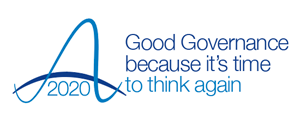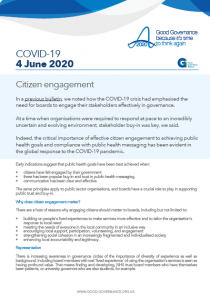Citizen engagement
04 June 2020

In a previous bulletin, we noted how the COVID-19 crisis had emphasised the need for boards to engage their stakeholders effectively in governance.
At a time when organisations were required to respond at pace to an incredibly uncertain and evolving environment, stakeholder buy-in was key, we said.
Indeed, the critical importance of effective citizen engagement to achieving public health goals and compliance with public health messaging has been evident in the global response to the COVID-19 pandemic.
Early indications suggest that public health goals have been best achieved when:
- citizens have felt engaged by their government
- there has been popular buy-in and trust in public health messaging
- communication has been clear and effective.
The same principles apply to public sector organisations, and boards have a crucial role to play in supporting public trust and buy-in.
Why does citizen engagement matter?
There are a host of reasons why engaging citizens should matter to boards, including but not limited to:
- building on people’s lived experiences to make services more effective and to tailor the organisation’s response to local need
- meeting the needs of everyone in the local community in an inclusive way
- encouraging local support, participation, volunteering, and engagement
- strengthening social cohesion in an increasingly fragmented and individualised society
- enhancing local accountability and legitimacy.
Representation
There is increasing awareness in governance circles of the importance of diversity of experience as well as background. Including board members with real ‘lived experience’ of using the organisation’s services is seen as having profound value. That means finding and developing, NHS trust board members who have themselves been patients, or university governors who are also students, for example.
Many boards recognise this and formally include in their composition specific posts intended to represent stakeholder groups. An important caveat, though, is for the role of board members in such positions to be clearly understood. Including ‘patient’ or ‘citizen’ board members should not be seen as the sole means of engaging with that stakeholder group. Their inclusion should instead be just one of a range of ways to engage with the groups of people they represent.
It is not always easy to recruit board members with the right skills and experience to ensure good governance, let alone those who also have representative experience. It’s a lot to ask of any individual. However, there are mechanisms to support the development of board members’ skills and capacity more generally that are applicable here.
Two such examples could be the development of ‘buddying’ partnerships between more established and less experienced board members, and the use of associate board memberships to help those interested in board-level roles develop their skills and experience before becoming full members.
Advice for boards
- Look at ways to support the development of new board members (including members who represent organisational stakeholders but may have less traditional board experience), such as buddying schemes, job-share roles, or associate board membership.
- Look at whether the board’s existing skills matrix adequately reflects stakeholder engagement and lived experience.
- Reflect as a board on who your people and place stakeholders are. Do you feel accountable to them? Would they be able to hold you to account?
- Consider mechanisms such as a patient story or staff story slot at board meetings to help the board get in the right frame of mind at the start of board discussions. Make sure these mechanisms are set up so as to properly support those willing to share their stories.
- For chairs: where boards already have representative members – for example, staff members – make sure their role is not seen as tokenistic, that they are treated the same as any other member, and that their views are not side-lined. Above all, ensure they are not presented with extra hurdles to full participation in board business and are not expected to speak only on their representative area.
Accountability
Just as executive directors are accountable to their boards for the delivery of the organisation’s strategy, organisations (and by extension boards) are accountable to their stakeholders. Sometimes the emphasis in public sector organisations around accountability understandably tends to focus on the expectations of regulators or funders, since their requirements and demands are generally the most pressing. But accountability to individual and local stakeholders is absolutely critical to organisational success.
In talking to non-executive directors with experience of working in a range of public sector organisations, it is evident that where organisations have a strong recognition of their accountability to people and place (i.e. their individual stakeholders and local communities), they are most successful in achieving their strategic goals.
Boards that are able to focus on people are generally much more engaged in their role than those who are solely focused on structural accountability. There is huge value to the board, both as a group and as individuals, to being able to focus on people. For example, many health sector boards now include a patient story slot which enables them to hear directly from patients. This can be profoundly motivating and also helps boards to get in the right frame of mind (i.e. sufficiently focused on what really matters) for the discussions that follow.
Questions boards need to be asking
- Is the board clear on who its key organisational stakeholders are? E.g. patients, staff, students, the community the organisation serves? Are some stakeholders better engaged than others?
- What are your existing mechanisms for listening to your stakeholders? Do they feel effective? Do stakeholders feel that they have appropriate mechanisms for being heard by the organisation?
- How do you as a board ensure the organisation is responding appropriately to input from stakeholders? How is the board assured that stakeholder engagement is authentic – i.e. that input is not just heard but acted on.
- How effective are you as a board at communicating with your stakeholders? How do you support good two-way communication? Are you using the right language to reach your stakeholders?
- Does the board provide leadership to the organisation on stakeholder engagement? Does it seek assurance that there is adequate consultation on key activities, for example? Is there executive team buy-in for stakeholder engagement? What does accountability for stakeholder engagement look like?
Call to action
At GGI we’ve been thinking about these issues and considering how we can help boards discharge their duties during this time of crisis. We will shortly be publishing fuller guidance on the role of the board in citizen engagement and we would welcome your views to help inform that guidance.
Friday’s 10am webinar will focus on better engagement with patients and communities. GGI will host this facilitated, virtual meeting to give NHS non-executive directors an opportunity to share their concerns, challenges and ideas. If you would like to join this meeting, please email events@good-governance.org.uk
https://www.good-governance.org.uk/events/good-governance-in-times-of-crisis-the-nhs-non-executive-director-5-june-2020-zoom-conference-call/
If you have any questions or comments about this briefing, please call us on 07732 681120 or email advice@good-governance.org.uk

Sophie Melton Bradley
Consultant

